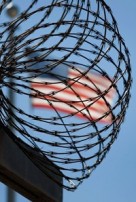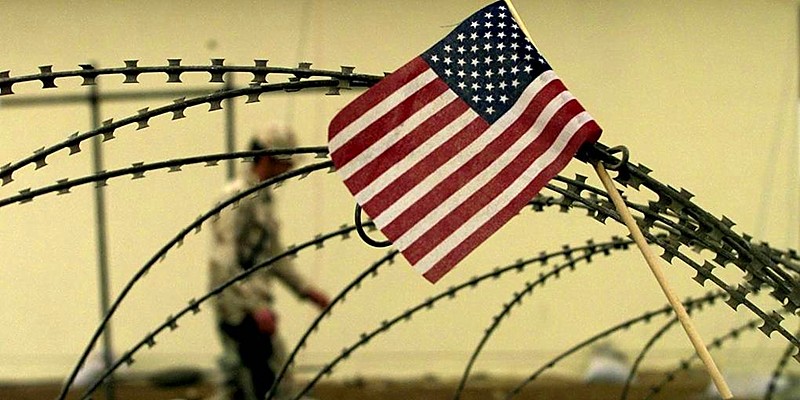The memory hole is deep at Guantánamo Bay.
Its gaping maw has swallowed international law, the lives of hundreds of detainees and the moral consequences of torture.
And now it has quite literally swallowed the memories of five men currently engaged in a prolonged pre-trial process at the infamous prison. They are the defendants charged with the criminal conspiracy leading to the attacks of 9/11, including the alleged “mastermind” behind the attack, Khalid Sheikh Mohammed.
But the mind of this master terrorist is not his own.
That’s according to a ruling by Army colonel and military commission judge James Pohl, who issued a “protective order” in January of 2013 that, in effect, classified the memories of Khalid Sheikh Mohammed and the other four defendants—Walid Bin Attash and Ramzi bin al Shibh of Yemen, Ammar al Baluchi of Pakistan, and Mustafa al Hawsawi of Saudi Arabia.
Their names remain opaque to most Americans, as do the legal proceedings based on their torturous experiences during “enhanced interrogation” at various “black sites.” Now, defense attorneys for the five men would like to file suit under the U.N. Convention Against Torture, which the United States signed in 1988 and ratified in 1994.
They cannot.
All legal claims of torture at the hands of the CIA during “extraordinary rendition” fall under the restrictive blanket of secrecy issued by Col. Pohl, who claims he is only empowered to classify material, not vice-versa.
This means the defendants’ personal stories, recollections and experiences cannot be told in any open court, recounted to journalists or human rights groups, nor can they be heard by international bodies like the United Nations.
In response to recent defense challenges to Pohl’s protective order, the prosecution countered with a rationale for secrecy drawn, it seems, from the pages of George Orwell or Philip K. Dick. According to Carol Rosenberg of the Miami Herald, one government prosecutor argued that “… the United States government has absolute control of U.S. captive’s CIA memories because where they were held and what was done to them is classified as ‘sources and methods’ used by the CIA in the now defunct Rendition, Detention and Interrogation program.”
Essentially, the memories of their treatment by the CIA have become the proprietary possession of the CIA. It is the ultimate application of “national security” as a legal fig leaf. And it illustrates the reality that “national security” classification often does more to protect people in the national security business than it does to protect the security of the nation.
Yet, it doesn’t always help in a criminal prosecution—which is why Mohammed al Qahtani remains in perpetual limbo in Gitmo’s memory hole. One of the men accused of being “The 20th Hijacker,” the case against al Qahtani was finally dropped in January of 2009 by retired judge Susan Crawford, the military commission’s Convening Authority. Why? Because Judge Crawford determined that his handling by the military was, in fact, torture.
There it is—torture.
And there al Qahtani sits—out of sight and out of mind in Gitmo.
The problem with his case makes the stories of the remaining 9/11 defendants all the more troublesome for the prosecution and potentially more damning to the CIA. Although it is widely known that Khalid Sheikh Mohammed (a.k.a. KSM) was waterboarded 183 times during his “interrogation,” much less is known about the depth, extent and range of the “techniques” employed on the other four by the CIA and/or their proxies.
We do know that KSM’s nephew, Ammar al Baluchi, is suffering from the lingering effects of a traumatic head injury, including memory loss, delusions and painful headaches. However, what his defense lawyer James Connell knows about the cause of the head injury comes primarily from unclassified records and what he gleaned from the movie “Zero Dark Thirty.”
That’s right.
It is believed that a sequence depicting enhanced interrogation in the film is modeled on the experiences of his client. In fact, it appears that the Obama Administration gave the filmmakers classified information relating to the treatment of al Baluchi that has not been made available to his defense lawyer. Now James Connell wants access to the same information made readily available to a few of Hollywood’s dreamweavers.
In the memory prison, one man’s classified memories are another man’s daily rushes.
And that’s not the half of it.
Although much remains classified, al Baluchi did write a first-person account of his experiences during “enhanced interrogation” and put it in an envelope. James Connell has not read it or tampered with it. He argued, thus far unsuccessfully, that he should be allowed to forward the handwritten account to the U.N. Special Rapporteur on Torture.
But Ammar al Baluchi’s memories don’t belong to Ammar al Baluchi. They belong to the U.S. Government, which had no qualms about giving their version of his memories to entertainers manufacturing a heroic movie. It is an ironic, almost sadistic juxtaposition to the defense’s request to hand over al Baluchi’s first-person story to international officials investigating torture. But it’s also the sort of legal jiu-jitsu that typifies the post-9/11 national security state—whether it protects the prying eyes of the NSA, keeps the President’s drone kill list safely out of view or conveniently obfuscates the practice of torture.
Detainees in Gitmo, “suspected” militants targeted by drones and secret defendants in the rubber-stamping FISA court all swirl down the grand memory hole of secrecy, sucked in by the same type of circular logic keeping Ammar al Baluchi’s memories imprisoned with him at Gitmo.
It’s the logic of preemption that keeps detainees locked up even after they’ve been cleared for release and will keep others never charged with a crime in an indefinite state of limbo.
It’s the logic of blind trust used by defenders of the NSA who make claims of foiled plots that can never be verified because the details are too secret for public consumption.
It’s the logic of legal loopholes that prevents defense teams from collecting evidence of their clients’ scars while the government blithely passes their “classified” memories to filmmakers, but also restricts the U.S. Senate’s report on torture.
And it’s the specious logic of a trial-like military commission that cannot reconcile itself, the law or the nation it represents with the truth about America’s dark experiment with torture.
Tweet





'The CIA’s Memory Prison' have 3 comments
November 7, 2013 @ 9:25 am leslie griffith
It seems everyday we ask ourselves, “can this be OUR America?”
The answer sadly is “Yes.”
Now that we know these things…we must respond with outrage.
thank you Mr. Sottile for bravely informing us.
November 8, 2013 @ 3:38 am Tom O'Neill
At the time of our revolutionary war, it was the general argument of our forefathers that we, the fledgling Americans, had rights because people in general have rights. The rights we claimed were, they argued, ours because they were the common endowment of humankind. Today, as we proclaim the Geneva Accords “quaint,” and as we argue that it would be a mistake to apply the Bill of Rights to foreigners because–after all–they are not Americans, we are rupturing the very tendons of our body politic. Predictably we are coming to see that the rights we denied others yesterday are beginning to be denied to us today. Nothing could be more ominous than the aberrational behavior Sottile thoughtfully chronicles here.
November 18, 2013 @ 11:10 am Sherlock
(1) Please show me the geographical boundaries of fundamental HUMAN RIGHTS. They are UNIVERSAL and, as RIGHTS granted by GOD, are EVERYWHERE.
(2) If you hire someone to commit a crime, be it murder, or torture, YOU are just as guilty as the AGENT you hired. As a CONSPIRACY to commit crime, you are doubly guilty.
(3) Guantanamo IS American soil, just as our EMBASSIES are considered American soil. If you rent a house, that is considered YOUR house.